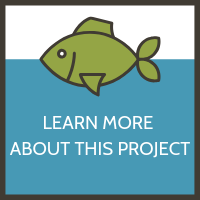December 5, 2019
Attila Karsi
Photo by Bangladesh Agricultural University
Bangladesh is naturally endowed with substantial freshwater resources, and fish account for more than half of animal-based proteins consumed by Bangladeshis. However, the deterioration of seed quality of fish due to inbreeding and scarcity of quality broodstock of the major cultivable species is now a significant threat for aquaculture expansion in the country.
As part of a quick start project with the Feed the Future Innovation Lab for Fish and to better understand the needs of fish farmers, Bangladesh Agricultural University (BAU) developed a survey schedule to survey farms located in Mymensingh, Rajshahi, and Jashore regions. Md. Samsul Alam, professor of fisheries, and Md. Akhtaruzzaman Khan, professor of agricultural finance, trained three master’s-level BAU students as enumerators for field data collection. Before the final data collection, students pretested the survey schedule with five rohu farmers. After the survey schedule was finalized, students, along with Alam and Khan collected survey data from a total of 184 fish farmers and 31 hatchery operators.
This field research was a rewarding experience for students.
“During the training, we combed through each question and every possible answer available to the farmers, checking for local relevance,” said Emran Hossain, one of the student enumerators. “I have learned so many unique things about the data collection, as I did not have any participation in such training early in my life. I will apply the knowledge gained from training during pretest and data collection in future research. Being an agricultural economics graduate, this training will enrich my knowledge about fisheries research at field level.”
Community engagement has made a difference for these three students who now have a better understanding of the need of rohu farmers. In addition to developing genetic resources for the genetic improvement of rohu, this project also helps local institutions through student training.
“I did not know how to do social science survey and how to convince respondents for their spontaneous participation during the interview period,” said Md. Al Masud, another student enumerator. “I believe the knowledge and skill achieved from this training and experience gathered through the survey will give me a plethora of confidence for this type of work in future. In a nutshell, this training will serve as a foundation for my entire career, being a student of the fisheries discipline.”
Analysis of the survey data will identify the most preferred quality for genetic improvement of rohu and development of superior rohu broodstock will help reduction of hunger and poverty.
Attila Karsi is an associate professor in the Mississippi State University College of Veterinary Medicine and is the U.S. PI for this project.

